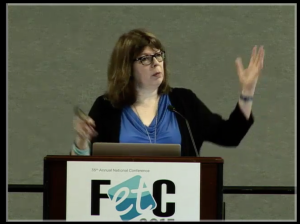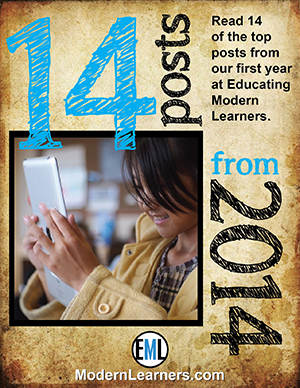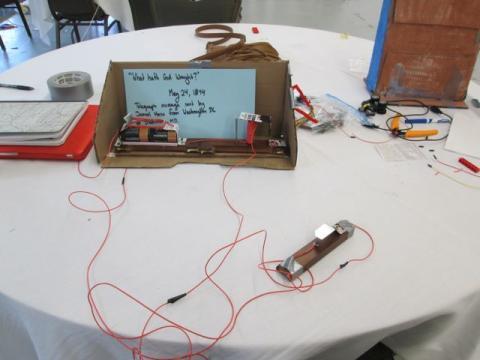Sylvia Libow Martinez's Blog, page 15
February 3, 2015
Video: FETC Featured Session Maker Movement Goes To School
 My recent session at FETC called “A Global Revolution Goes To School: The Maker Movement” in video. This shows both the presentation and slides, although some of the movies didn’t really get captured fully.
My recent session at FETC called “A Global Revolution Goes To School: The Maker Movement” in video. This shows both the presentation and slides, although some of the movies didn’t really get captured fully.
January 14, 2015
Free e-book! Best of EML 2014
 Free e-book
Free e-bookI’m honored to have an article included in Educating Modern Learner’s compilation of their Best of 2014 articles. Even better, it’s available for free as a lovely e-book!
Educating Modern Learners is a new website created to help every school leader become better informed to make better, more relevant decisions for the children they serve in this new, modern world of learning.
My article, What a Girl Wants, is included in this e-book, along with 13 other terrific essays and analysis...
December 18, 2014
FabLearn Resources for Making in Classrooms, Libraries, Museums, & Community Centers
The Stanford FabLearn Fellows have posted some of their favorite resources on making in education.
3D Design & Printing
Arts & Crafts
Assessment & Feedback
Building Spaces
CNC
E-Textiles
Learning Electronics
Making and Informal Education
Physical Programming
December 4, 2014
How tos: New Making in Education posts from the FabLearn Fellows
 Severalrecent FabLearn Fellow blog posts have created a lot of room for discussion around the topics of fabrication, making, and design in museums and classrooms. Please comment and add your voice!
Severalrecent FabLearn Fellow blog posts have created a lot of room for discussion around the topics of fabrication, making, and design in museums and classrooms. Please comment and add your voice!
A brief overview of recent posts:
In18th Century Buildings, Vector Drawing, History, and Math, Heather Pang explores how a project designed to be a simple skill-builder evolved into something more.
Christa Flores tacklesMaking for Making Sake? or STEAM for 21st Century Job Skills?weaving in educationa...
November 21, 2014
Are programmers born that way?
A commentI hear every once in a while goes something like this: “Why teach programming to everyone? There is a “programmer type” and not all kids are “that way”. It’s just a waste of everyone’stime!”
I don’t agree. I believe programming is a liberal art – a way to express yourself and make sense of the world.
I recognize the stereotype. I was that kid. Driven, intense, socially awkward, and able to tune out the outside world. I also believe that many programmers today do fit that “nerd” profile...
November 20, 2014
Should schools embrace making because it develops job skills?
I often hear that making, especially learning to program, is valuable because it develops “job skills”.
However, I don’t advocate for programming or making or tinkering because it’s a job skill. In fact, the “STEM crisis” is largely a myth. (See this IEEE article series.)There is even speculation that this is largely manufactured by companies trying to get more visas for lower paid workers, plus drive down salaries for veteran engineers and scientists by inflating the numbers of graduates.
That...
November 16, 2014
New report: Making and Tinkering: A Review of the Literature
A new literature review was just released by theBoard of Science Education(an NSF funded program associated with theNational Academies) called:
Making and Tinkering: A Review of the Literature, by Shirin Vossoughi and Bronwyn Bevan
http://www.sesp.northwestern.edu/docs/publications/1389898569543ea0951a19d.pdf
The Board of Sciences has commisioned this and several other papers focused oninformal and afterschool STEM learning. More information and links to the other papers are on their website.htt...
November 14, 2014
Infographic: The road from Maker to computer science and engineering for girls and women
November 13, 2014
Is “Student-Centered” Just Code for Lord of the Flies?
Working this past year with the FabLearn Fellows has been an incredible experience. These 18 educators from around the globe are leading the way to understanding the benefits of “making” in formal and informal learning spaces.
This post from Christa Flores, called,The “Unstructured Classroom” and other misconceptions about Constructivist Learningtackles some of the misunderstandings that people have about making in the classroom. There is fear that “letting go” of the reins as a teacher means...
November 11, 2014
Carefully calibrated details with no meaning – measuring learning
I’ve been thinking a lot about measurement lately. It feels like a key factorin distinguishing “making” that matters in the classroom. Student’s capacityto use measurement, andits little sisters, precision and accuracy, should get more refined and complex as they get older.
The flip side of teaching students to measure is to measure student learning. How does assessment work in a classroom where students are doing different and unexpected things?
I just ran across this article byRobert Crease,...




